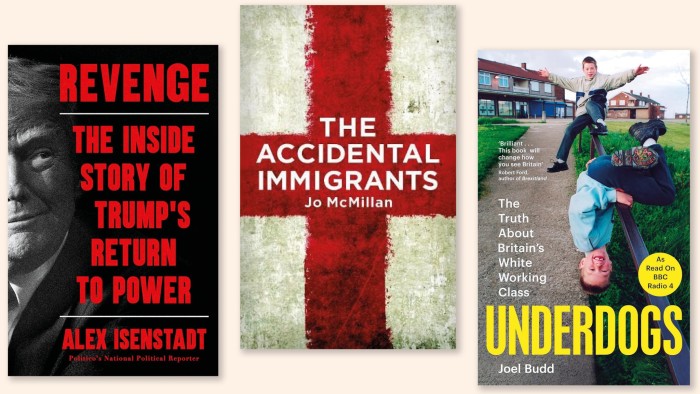Unlock the White House Watch newsletter for free
Your guide to what Trump’s second term means for Washington, business and the world
How did we get here? As Donald Trump’s second presidency continues to be even more chaotic and destructive to the world order than his first, and governments in Europe struggle to hold off their own Trumpian challenges, the question is ever more relevant.
There are few better insights into the “how” than Alex Isenstadt’s Revenge: The Inside Story of Trump’s Return to Power (Grand Central Publishing £16.99). Isenstadt, formerly of Politico and now of Axios, knows the Trump beat better than most and the result is a book full of terrific insight into the heart of Trump’s return to the White House, from the assault on the Capitol on January 6 2021 that marked the ignominious end to first term to his second inauguration four years later. It is, at its core, a story of the remarkable, animalistic drive of Trump, and the efforts of the people around him to shape and direct that drive into something resembling an orthodox presidential campaign.
It is perhaps best summed up by Trump’s pitch to Susie Wiles as to why she should take over his president campaign: “I don’t know if I have any money; I don’t know if they’re stealing from me; I don’t know who’s in charge. I don’t know what’s going on. I need you to take over.” Trump’s second White House is already showing the limits of that approach now that the campaign is over and Trump once again has to govern.
For western governments fearing that they will be replaced by their own Trumpesque rivals, “getting a grip” over their borders has become their watchword. In The Accidental Immigrants (Bluemoose Books, £10.99) the novelist Jo McMillan uses the very real bureaucracy of the UK home office to construct a story of two fictional lovers: Tess, a dual passport holder, whose lover, Arlo, has come from Britain to the fictional island of St Mira and now has no passport at all. When the island’s politics turn sharply against the British minority they are thrown into a desperate battle for survival and refuge. If the description sounds painfully didactic the book fortunately is anything but: it illuminates the process of border-crossing and makes one think freshly about your own place in the world without ever feeling like you have been tricked into a civics lecture.
Where The Accidental Immigrants is fictional, and is told from below Michelle Clement’s The Art of Delivery: The Inside Story of How the Blair Government Transformed Britain’s Public Services (Biteback £25) is consciously narrow and very real. The book tells the story of the Delivery Unit, created by a frustrated UK prime minister Tony Blair in 2001. Under the leadership of its first chief, special adviser turned civil servant Michael Barber, the unit transformed how Blair’s Downing Street operated. Clement, who has interviewed essentially all the surviving key players, also has drawn extensively from Barber’s unpublished diaries.
Depressed Starmerites may draw some comfort from the parallels between that government’s early struggles and their own. Barber’s discussion of some of the downsides of working in Blair’s Downing Street could be straight out the private conversations Labour aides working for Sir Keir Starmer have today: “The intrigues around the King [Blair], the competition for influence, Blair’s obsession with presentation.” What emerges in Clement’s book is that the making of the Delivery Unit is in part about Barber’s administrative flair and the importance of structures: but it is also about Blair’s underrated strengths as a leader and decision maker.

A group frequently ventriloquised by politicians, Joel Budd observes in his excellent book Underdogs: The Truth About Britain’s White Working Class (Picador £20) is the “white working class”. Budd, an Economist reporter, travels widely through the UK, but he avoids the usual pitfalls of the poverty safari. The book’s one shortcoming is its relatively narrow focus — “I describe people as white Britons if they tick that box, or if I think most people would see them as such” is Budd’s approach. But it would surely be worth exploring the way the white working class has intermingled with the UK’s longest standing immigrant groups, particularly those from the West Indies. Nonetheless, his book, like Clement’s, is a deeply reported and engaging affair that illuminates the UK’s present political moment superbly.
Join our online book group on Facebook at FT Books Café and follow FT Weekend on Instagram, Bluesky and X




